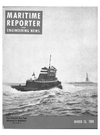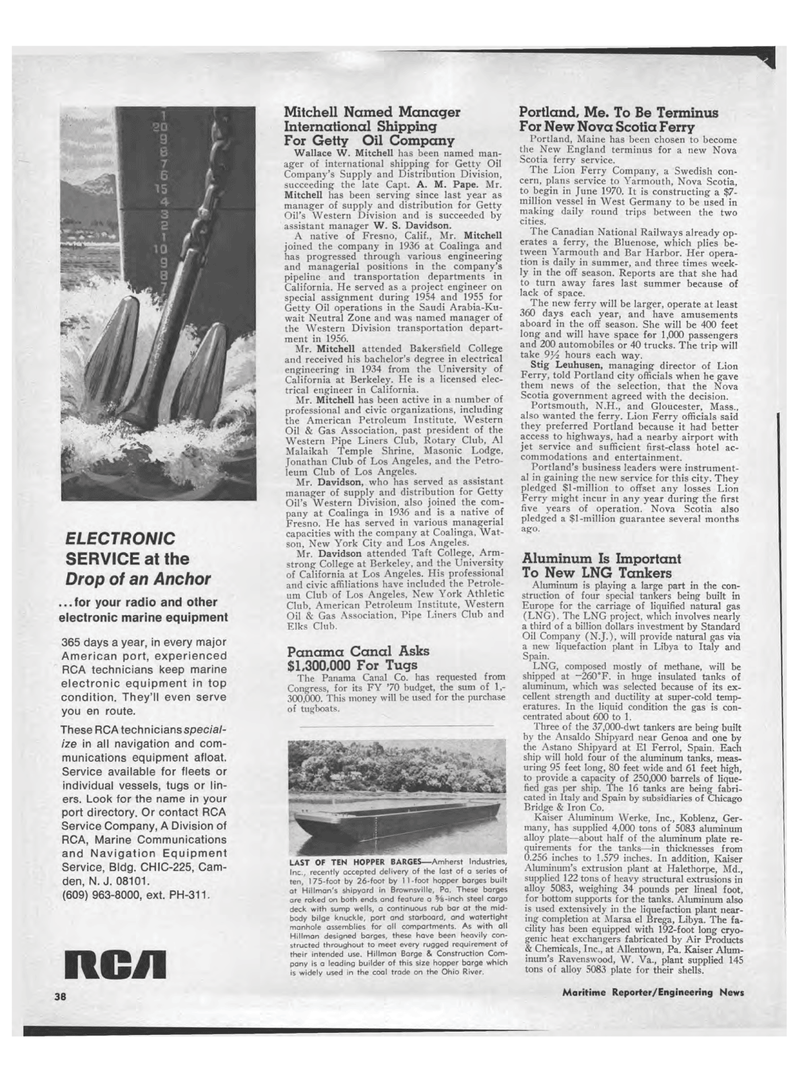
Page 36: of Maritime Reporter Magazine (March 15, 1969)
Read this page in Pdf, Flash or Html5 edition of March 15, 1969 Maritime Reporter Magazine
ELECTRONIC SERVICE at the Drop of an Anchor ...for your radio and other electronic marine equipment 365 days a year, in every major American port, experienced RCA technicians keep marine electronic equipment in top condition. They'll even serve you en route. These RCA technicians special-ize in all navigation and com-munications equipment afloat. Service available for fleets or individual vessels, tugs or lin-ers. Look for the name in your port directory. Or contact RCA Service Company, A Division of RCA, Marine Communications and Navigation Equipment Service, Bldg. CHIC-225, Cam-den, N. J. 08101. (609) 963-8000, ext. PH-311. Mitchell Named Manager International Shipping For Getty Oil Company Wallace W. Mitchell has been named man-ager of international shipping for Getty Oil Company's Supply and Distribution Division, succeeding the late Capt. A. M. Pape. Mr. Mitchell has been serving since last year as manager of supply and distribution for Getty Oil's Western Division and is succeeded by assistant manager W. S. Davidson. A native of Fresno, Calif., Mr. Mitchell joined the company in 1936 at Coalinga and has progressed through various engineering and managerial positions in the company's pipeline and transportation departments in California. He served as a project engineer on special assignment during 1954 and 1955 for Getty Oil operations in the Saudi Arabia-Ku-wait Neutral Zone and was named manager of the Western Division transportation depart-ment in 1956. Mr. Mitchell attended Bakersfield College and received his bachelor's degree in electrical engineering in 1934 from the University of California at Berkeley. He is a licensed elec-trical engineer in California. Mr. Mitchell has been active in a number of professional and civic organizations, including the American Petroleum Institute, Western Oil & Gas Association, past president of the Western Pipe Liners Club, Rotary Club, A1 Malaikah Temple Shrine, Masonic Lodge, Jonathan Club of Los Angeles, and the Petro-leum Club of Los Angeles. Mr. Davidson, who has served as assistant manager of supply and distribution for Getty Oil's Western Division, also joined the com-pany at Coalinga in 1936 and is a native of Fresno. He has served in various managerial capacities with the company at Coalinga, Wat-son, New York City and Los Angeles. Mr. Davidson attended Taft College, Arm-strong College at Berkeley, and the University of California at Los Angeles. His professional and civic affiliations have included the Petrole-um Club of Los Angeles, New York Athletic Club, American Petroleum Institute, Western Oil & Gas Association, Pipe Liners Club and Elks Club. Panama Canal Asks $1,300,000 For Tugs The Panama Canal Co. has requested from Congress, for its FY 70 budget, the sum of 1,-300,000. This money will be used for the purchase of tugboats. ncii LAST OF TEN HOPPER BARGES?Amherst Industries, Inc., recently accepted delivery of the last of a series of ten, 175-foot by 26-foot by 1 1-foot hopper barges built at Hillman's shipyard in Brownsville, Pa. These barges are raked on both ends and feature a %-inch steel cargo deck with sump wells, a continuous rub bar at the mid-body bilge knuckle, port and starboard, and watertight manhole assemblies for all compartments. As with all Hillman designed barges, these have been heavily con-structed throughout to meet every rugged requirement of their intended use. Hillman Barge & Construction Com-pany is a leading builder of this size hopper barge which is widely used in the coal trade on the Ohio River. Portland, Me. To Be Terminus For New Nova Scotia Ferry Portland, Maine has been chosen to become the New England terminus for a new Nova Scotia ferry service. The Lion Ferry Company, a Swedish con-cern, plans service to Yarmouth, Nova Scotia, to begin in June 1970. It is constructing a $7-million vessel in West Germany to be used in making daily round trips between the two cities. The Canadian National Railways already op-erates a ferry, the Bluenose, which plies be-tween Yarmouth and Bar Harbor. Her opera-tion is daily in summer, and three times week-ly in the off season. Reports are that she had to turn away fares last summer because of lack of space. The new ferry will be larger, operate at least 360 days each year, and have amusements aboard in the off season. She will be 400 feet long and will have space for 1,000 passengers and 200 automobiles or 40 trucks. The trip will take 9x/2 hours each way. Stig Leuhusen, managing director of Lion Ferry, told Portland city officials when he gave them news of the selection, that the Nova Scotia government agreed with the decision. Portsmouth, N.H., and Gloucester, Mass., also wanted the ferry. Lion Ferry officials said they preferred Portland because it had better access to highways, had a nearby airport with jet service and sufficient first-class hotel ac-commodations and entertainment. Portland's business leaders were instrument-al in gaining the new service for this city. They pledged $l-million to offset any losses Lion Ferry might incur in any year during the first five years of operation. Nova Scotia also pledged a $l-million guarantee several months ago. Aluminum Is Important To New LNG Tankers Aluminum is playing a large part in the con-struction of four special tankers being built in Europe for the carriage of liquified natural gas (LNG). The LNG project, which involves nearly a third of a billion dollars investment by Standard Oil Company (N.J.), will provide natural gas via a new liquefaction plant in Libya to Italy and Spain. LNG, composed mostly of methane, will be shipped at ?260°F. in huge insulated tanks of aluminum, which was selected because of its ex-cellent strength and ductility at super-cold temp-eratures. In the liquid condition the gas is con-centrated about 600 to 1. Three of the 37,000-dwt tankers are being built by the Ansaldo Shipyard near Genoa and one by the Astano Shipyard at El Ferrol, Spain. Each ship will hold four of the aluminum tanks, meas-uring 95 feet long, 80 feet wide and 61 feet high, to provide a capacity of 250,000 barrels of lique-fied gas per ship. The 16 tanks are being fabri-cated in Italy and Spain by subsidiaries of Chicago Bridge & Iron Co. Kaiser Aluminum Werke, Inc., Koblenz, Ger-many, has supplied 4,000 tons of 5083 aluminum alloy plate?about half of the aluminum plate re-quirements for the tanks?in thicknesses from 0.256 inches to 1.579 inches. In addition, Kaiser Aluminum's extrusion plant at Halethorpe, Md., supplied 122 tons of heavy structural extrusions in alloy 5083, weighing 34 pounds per lineal foot, for bottom supports for the tanks. Aluminum also is used extensively in the liquefaction plant near-ing completion at Marsa el Brega, Libya. The fa-cility has been equipped with 192-foot long cryo-genic heat exchangers fabricated by Air Products & Chemicals, Inc., at Allentown, Pa. Kaiser Alum-inum's Ravenswood, W. Va., plant supplied 145 tons of alloy 5083 plate for their shells. 38 Maritime Reporter/Engineering News

 35
35

 37
37
